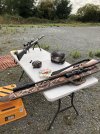As alluded to, what you are asking is a lawyer question and not a gun guy question. We all have experiences that we think are going well but we're not lawyers and we really don't know how well we've done until it gets tested in court or whatever.
I had some legal questions and you should ask them of your trust provider/lawyer.
What is my personal set of goals for the trust? Just one NFA item or many, I have a big family or no family, I have heirs who want them or I don't, I plan to move to another state soon or not, etc.
Once you have the goals in mind these are things to ask and understand:
Who can legally possess under this trust?
What happens when I die? How does this dovetail with my estate plan/will/probate?
What happens if I am legally prevented from owning NFA items going forward, but others on the trust are not? Also same question for someone on the trust becoming legally prevented from owning NFA items.
What happens when I move?
What if someone on the trust moves to another state, friendly or not?
How do I add people to the trust?
How do I remove people from the trust?
How do I add assets (suppressors, SBR's, etc.) to the trust?
What if I go bankrupt or divorce or have a large legal judgment - can these assets be attached? Same question for the other trust participants.
This list is not exhaustive which is why a lawyer has to think about it.
Personally I went with only myself on the trust while acquiring, then I can add parties (at least presently).
If I add people to the trust and then find myself wanting to add assets to the trust, I may just get another trust.
You don't need to get all vapor-locked over this. But the question "what is the best trust" made me think you haven't appreciated the fact that you need to determine your own goals for the trust

